Democrats Deserve Better Than Beto O’Rourke
Progressives have taken a shine to the former Senate hopeful. But a closer look at the Texan's record reveals a flawed presidential candidate for 2020.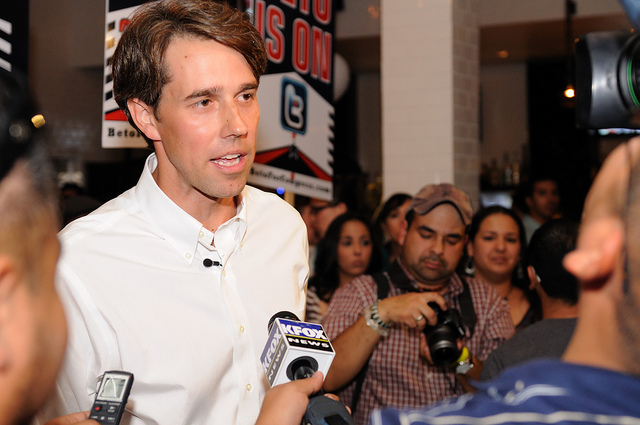 Rep. Beto O'Rourke, D-Texas, narrowly lost his Senate bid in 2018. (Beto O'Rourke / Flickr)
Rep. Beto O'Rourke, D-Texas, narrowly lost his Senate bid in 2018. (Beto O'Rourke / Flickr)
News media tell us that Beto O’Rourke has reached the top tier of potential contenders for the 2020 Democratic presidential nomination. CNN polls now rank him in third place—behind only Joe Biden and Bernie Sanders—among likely Iowa caucusgoers as well as among Democrats nationwide.
Progressives are apt to be enthusiastic about O’Rourke — if they don’t know much about his record.
Inclinations to hop on the Beto bandwagon are understandable. O’Rourke was inspiring this year as he fought to unseat the despicable U.S. Senator Ted Cruz with a campaign that built a broad coalition of Texans, while gaining huge small-dollar support from across the country. In late summer, many were thrilled by a video of O’Rourke’s response to a question about NFL players kneeling in protest during the national anthem; his ringing defense of dissent in the context of civil rights history was excellent.
Cruz had to sweat it out on election night and won by only 2.6 percent, a slim margin in such a conservative state. Since then, publicity about Beto O’Rourke potentially running for president has mushroomed, with corporate news outlets portraying him as a progressive.
Released a week ago, the much-publicized results of a poll that MoveOn conducted of people on its email list found O’Rourke in first place, neck-and-neck with Joe Biden and Bernie Sanders. Media spin intensified, portraying Beto as a challenge to Bernie.
NBC News broke the news of the MoveOn poll while calling it “a potentially troubling indication for Sanders.” A couple of days later, the New York Times speculated that “Mr. Sanders’s hold on the party’s progressive base may be slipping as a new generation of Democrats like Representative Beto O’Rourke demonstrate early strength in polls and straw polls, such as the one conducted this week by the liberal group MoveOn.”
Meanwhile, Democracy for America was concluding a poll of its own active supporters online. As the second week of December began, the organization’s website was showing Bernie Sanders far ahead in the top spot at 38 percent, followed by Biden at 15 percent, O’Rourke at 12, Elizabeth Warren at 8, and Kamala Harris at 7. (DFA later removed the running totals from its site until release of final numbers.)
Given their at-times extreme antipathy toward Bernie during his first presidential run, mainstream news media are likely to have an appetite for a 2019 storyline that Sanders’ support is eroding. O’Rourke is apt to be quite useful for such a narrative. The Democratic Party establishment that went all-out to get Hillary Clinton the 2016 nomination is palpably eager to block Bernie. And some in that establishment are already indicating that they believe O’Rourke might do the trick.
A revealing sign came early this month from a leading sentinel of the Democratic Party’s corporate wing — the relentless Clinton loyalist Neera Tanden, president of the Center for American Progress. What set her off was a matter-of-fact tweet from investigative reporter David Sirota, who told people “Something I didn’t know: Beto O’Rourke is the #2 recipient of oil/gas industry campaign cash in the entire Congress.” Sirota provided a link to campaign finance data.
Tanden quickly went into onslaught overdrive with a tweet lashing out at the sharing of such information about the three-term congressman: “Oh look. A supporter of Bernie Sanders attacking a Democrat. This is seriously dangerous. We know Trump is in the White House and attacking Dems is doing Trump’s bidding. I hope Senator Sanders repudiates these attacks in 2019.”
A money-in-politics reporter, Alex Kotch, responded that he was “pretty shocked” to see Tanden attack Sirota for simply sending out a factual tweet: “Tanden, a close Clinton ally and Bernie Sanders foe, has had a contentious relationship with the left, with which Sirota is often associated. But her claim that a reporter’s tweet of campaign finance statistics about a potential 2020 candidate was a dangerous attack that Trump would have ordered? Who was really being attacked here?”
For some context, Kotch added: “It’s worth noting that the Center for American Progress has in the past accepted donations from multiple fossil fuel companies and, as of 2017, was still receiving money from Pacific Gas and Electric Company. During the 2016 Democratic Platform Committee’s drafting process, Tanden voted against a fracking ban, a carbon tax, and a measure to keep fossil fuels in the ground.”
Kotch followed up on Dec. 12 by reporting: “I have confirmed that according to the latest campaign finance report, which covers the period from Oct. 17 through Nov. 26, the O’Rourke campaign had not returned 29 ‘large donations’ of over $200 from oil and gas executives, violating the No Fossil Fuel Money pledge O’Rourke signed.”
Beto O’Rourke’s actual political record deserves scrutiny, and it’s not what progressives might expect from the overheated adulation that has sent his presidential balloon aloft. Some pointed reporting and critiques this month may have begun a process of bringing Beto fantasies down to earth. For instance:
** Under the headline “Why This Progressive Texan Can’t Get Excited About Beto O’Rourke,” columnist Elizabeth Bruenig looked ahead to the upcoming presidential race: “I think the times both call for and allow for a left-populist candidate with uncompromising progressive principles. I don’t see that in O’Rourke.” She noted that “O’Rourke’s statements on energy have been surprisingly thin” — and that “he has called the decision between oil and gas and renewable energy sources ‘a false choice.’” Bruenig concluded: “We still have time to pick a politician with a bold, clear, distinctly progressive agenda, and an articulated vision beyond something-better-than-this, the literal translation of hope-change campaigning. Beto is a lot like Obama, true; it’s perhaps time for left-leaning Democrats to realize that may not be a good thing.”
** A similar insight came from another progressive Texan, Dan Derozier, who chairs the elections committee of Houston Democratic Socialists of America. He wrote: “O’Rourke’s message covers rhetorical territory familiar from the Obama era: It’s positive and innocuous, but noncommittal. It relies on lofty but meaningless phraseology like Shared Values, Finding Common Ground and Bringing People Together. The message describes itself with words like ‘ambitious’ and ‘bold,’ but doesn’t promote any specific policy that could actually be described as such.”
Derozier summed up: “Before choosing O’Rourke as their next presidential nominee, Democrats would do well to reflect on the perils of preferring style over substance, consider the benefits of expanding their political imagination, and, most importantly, remember that political moments like O’Rourke’s are rare. Democrats shouldn’t waste the next one.”
** An in-depth article by political journalist Zaid Jilani — headlined “What Does Beto O’Rourke Actually Stand For?” — indicates that O’Rourke doesn’t stand for much that progressives should embrace. During his six years in the House of Representatives, O’Rourke has been politically close to inert. “While the Democratic base is coalescing around single-payer health care and free college, O’Rourke sponsored neither House bill. During his time in Congress, he never joined the Congressional Progressive Caucus. He has been, however, a member of the New Democratic Caucus, the group organized to carry on the ideas of Clintonite policies. During the 2016 presidential primary, he stayed on the sidelines.”
Nor can O’Rourke’s caution be chalked up to conservative constituents in Texas. His 16th congressional district, centered in El Paso, “is among the more liberal in the country,” Jilani pointed out.
“While O’Rourke steadily avoided left-wing legislation, he went above and beyond to ally himself to the corporate wing of the Democratic Party,” Jilani reported. “In 2015, Congress narrowly gave President Obama so-called ‘Fast Track’ authority as it related to the Trans-Pacific Partnership… which many labor, consumer, human rights, and environmental advocates worried would vastly expand the power of investors and corporations and undermine U.S. sovereignty…. O’Rourke was one of the Democrats who voted to grant the authority to Obama…. What populists like [Elizabeth] Warren and Sanders feared most about the TPP was its vast expansion of patent and copyright protections — which could lock in arduous high drug prices, among other things. Regardless, O’Rourke continues to be a defender of these sorts of agreements. During his Senate run, the local press noted that he and Cruz essentially agreed on the merits of the North American Free Trade Agreement.” Such positions in favor of so-called free trade can hardly play well in Rust Belt states that put Trump in the White House.
Jilani’s assessment concluded: “The next president should be someone with a record of sticking their neck out against concentrated power, someone who has made tough decisions even when it may anger donors and political elites, and someone who has accomplished a great deal of actual tangible real change in the world. There are a number of people who fit that description, but it’s difficult to say O’Rourke is one of them.”
** In Jacobin magazine, writer Branko Marcetic describes the political record a bit more favorably. On the one hand, he gives O’Rourke credit for “advocating for drug legalization and health benefits for same-sex and unmarried partners in El Paso” as well as “staunchly defending immigrants’ rights, the right to abortion, and speaking out against border militarization in Congress.” Also, O’Rourke “bucked Obama on several important issues, pressuring him to close Guantanamo, supporting legislation to curtail NSA spying, opposing war in Syria and arming the country’s rebels, and demanding Obama get congressional authorization for his continued war on ISIS.”
On the other hand, Marcetic explains, O’Rourke actively tried to “chip away at the Dodd-Frank financial reform law” and has cast many awful votes siding with big banks and against workers. His years in the House “have given him one of the better U.S. Chamber of Commerce voting scores among Democrats.” And O’Rourke’s congressional votes on criminal justice have often been on the side of repressive measures.
“O’Rourke is a decent, progressive candidate in slowly purpling Texas,” Marcetic wrote, “but when you put him on the national stage and drill down on his record, he becomes just another flawed Democrat…. Politicians like Beto O’Rourke represent a step forward for states like Texas. Making them national standard-bearers is a step backward.”
As candidates and in office, the last two Democratic presidents have been young, dynamic and often progressive-sounding, while largely serving the interests of Wall Street, big banks, military contractors and the like. Do we need to make it three in a row?
Your support matters…Independent journalism is under threat and overshadowed by heavily funded mainstream media.
You can help level the playing field. Become a member.
Your tax-deductible contribution keeps us digging beneath the headlines to give you thought-provoking, investigative reporting and analysis that unearths what's really happening- without compromise.
Give today to support our courageous, independent journalists.
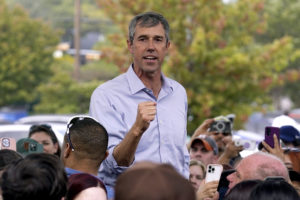
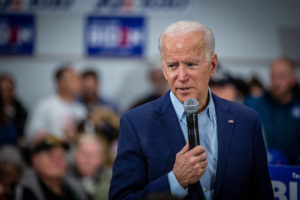
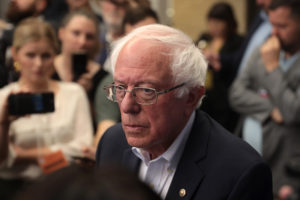

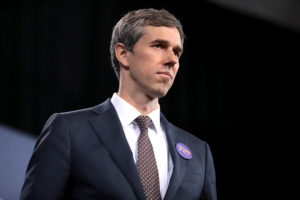
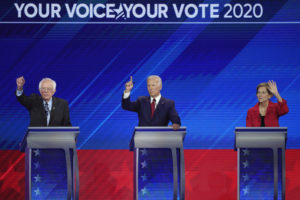


You need to be a supporter to comment.
There are currently no responses to this article.
Be the first to respond.